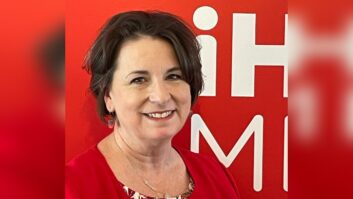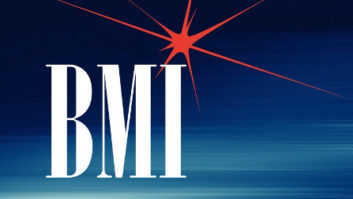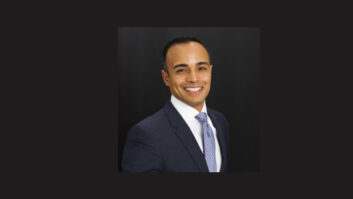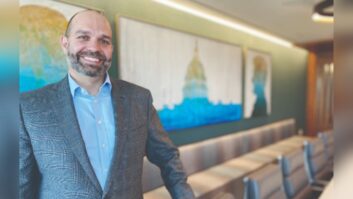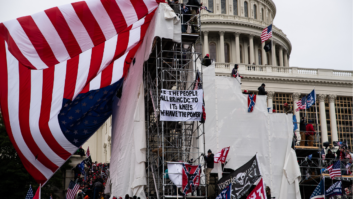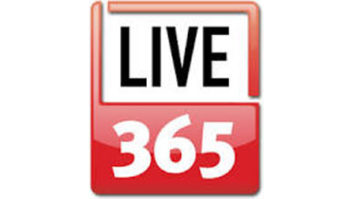PHILADELPHIA
It seems the NAB Radio Show will look much different next year, with a different type of venue and smaller overall feel. Though plans have yet to be finalized, some details were known by the end of this year’s event in Philadelphia.
What follows is a sampling of news from the confab.
At this year’s show, several types of HD Radio portables were displayed, with some available now and others expected during the holiday season.
With a new administration comes three new faces at the top of the Federal Communications Commission; two of those three made their first appearance before broadcasters at this event and spoke of how much has changed at the Portals under the new chairman.

Former U.S. senator and new NAB President/CEO Gordon Smith ‘can’t wait to get started’ in his new gig, which begins Nov. 1. © NAB And NAB’s soon-to-be chief executive, former Sen. Gordon Smith, addressed broadcasters for the first time in his new role and was visible in the sessions and on the exhibit floor.
2010 Show in D.C., Exhibit Changes Afoot
Next year’s radio show will be in Washington, two months before the mid-term elections in Congress, giving attendees a chance to visit congressional offices. The show may also be timed to coincide with the annual Group Head Fly-In.
NAB Radio Board Chair Chuck Warfield, president and chief operating officer of ICBC Broadcast Holdings, announced the choice of city, although the dates and specific venue were not final in late September. The trade association is still talking to exhibitors about planned changes in the structure to integrate displays better with the rest of the show, according to spokesman Dennis Wharton, who said this could result in a smaller exhibit area.
The trade association is considering using tabletop displays rather than larger booths; NAB could then choose a hotel, rather than a convention center, to hold the show, and save money and staff time, according to the association.
Presumably, the cost to exhibit would go down as well, and vendors would save money in this scenario by cutting their shipping costs.
While a tabletop approach wouldn’t change exhibit plans much for programmers, it could have big ramifications for some transmission and other equipment manufacturers, whose customers like to see the gear set up and working.
One representative of an RF manufacturer said the changes would turn the radio event more into a regional show, speculating that the schedule would include “dark” times for exhibits while sessions were taking place and vice versa.
Pointing to a transmitter in a booth, another company’s representative said, “We could have this conversation whether this was here or not. [But] having the dialog about upcoming projects is as important as what’s under the hood.”
A representative of a third transmission manufacturer, asked about the likely impact of changes, simply said “We’ll see.” His concern was that customers would be left seeing gear at only the spring NAB Show; he said some customers won’t travel to Las Vegas for religious or other reasons.
Several hardware vendors told Radio World that the proposed changes would not be a concern because much of the floor already consists of smaller booths. However the head of one transmitter company said a tabletop approach would be “terrible” and would seem to send a signal that the industry is “giving up.”
Wharton also confirmed the changes are only being discussed for the radio show, and would not affect the spring event.

‘Welcome to the new FCC,’ Commissioner Mignon Clyburn said as she introduced an agency panel. © NAB New FCC Touted
“Welcome to the new FCC.”
That’s how new Commissioner Mignon Clyburn, a Democrat, characterized the mood at the agency these days as staffers seek more input from outside the beltway and open lines of communications within the commission itself.
Chairman Julius Genachowski, she says, is giving the agency bureaus and office a more robust role in decision-making than they’ve enjoyed previously.
The FCC’s new Media Bureau Chief Bill Lake has pledged to clear up a backlog of several radio decisions, saying at a session that his department is “paid to make decisions and not put them off.” Lake said the bureau, in concert with the Audio Division, has been working to make some decisions about radio items that have been languishing.
Panelist Bill Freedman, an acting legal advisor to Commissioner Meredith Attwell Baker, a Republican, agreed. “You’re going to get faster, appropriate decisions.” When licensees go to the Portals, he said, they’ll see “people with smiles on their faces.” There “really is a fresh breeze” blowing through the commission, he said.
Input on ‘Radio Rescue’ Proposal Sought
The commission is now taking public comments on the so-called Radio Rescue Petition submitted in July by the Minority Media Telecommunications Council. Comments on Report # 2899 or RM # 11565 are due Oct. 23. The notice came out during the show.
This is a step just before a rulemaking. After reviewing the comments, the commission could then issue a Notice of Inquiry or a Notice of Proposed Rulemaking, a source close to the agency told Radio World.
The 17 proposals in the petition would modernize “archaic broadcast engineering rules” that “operate as market entry barriers, effectively stifling diversity and impeding competition,” according to MMTC in its document.
The group believes the changes would make it easier for women and minorities to buy their first stations. MMTC supports the Broadcast Maximization Committee proposal to re-purpose analog TV Channel 5 and 6 and expand the NCE service, reallocate LPFMs and allow all interest AMs to migrate to between 76 to 88 MHz.
MMTC also proposes the FCC eliminate nighttime coverage rules, give AMs more flexibility in finding tower sites, limit third-adjacent spacing, hold owners to 10 translators apiece and extend new station construction permits to three years.
Translators for AMs Deemed a ‘Great Success’
Rules allowing some AMs to operate on FM translators became permanent on Oct. 1.
In June, the commission changed its translator rules to allow AMs to use currently authorized FM translators to retransmit their AM service within their current AM coverage areas.
Audio Division Chief Peter Doyle said the rule changes have been a “great success,” with 250 AMs rebroadcasting on an FM as of late September. Some of those AMs are originating programming at night for the first time, with lots of Friday night football games, Doyle added.
Another 10 to 20 new applications are filed each day. It’s not clear how many of those would be approved. “It’s an issue of spectrum supply and broadcaster demand,” he said, noting that owners need to figure out of they have the programming and advertising to justify the move to FM.
As of Oct. 1, Special Temporary Authorizations allowing AMs to operate on FM translators were to be cancelled.

From left: Peter Doyle, audio division chief; Bill Lake, media bureau chief; Sherrese Smith, media legal advisor to the chairman; Bill Freedman, acting media legal advisor to Commissioner Meredith Attwell Baker; and Rick Kaplan, acting media legal advisor to Commissioner Mignon Clyburn. © NAB As for FM translators in general, what to do with pending applications is high on the commission’s list of radio items to act on, according to Media Bureau Chief Bill Lake. Since 2005 the FCC has frozen new grants and later it proposed limiting applicants to 10 translators a piece. Subsequently filers proposed raising the cap to 50.
How Much LPFM Spectrum Is There?
Legislation is pending in Congress to remove third-adjacent-channel protections for full-power stations to make room for more LPFMs.
But could there be room for more low-power FMs even without that change? The question was put to the panel at the FCC session.
There are more than 810 LPFMs on the air. Audio Division Chief Peter Doyle said it is debatable how much spectrum is available. The commission has said it would open a window to accept applications for new LPFMs next — before the next AM window or non-com translator window. The FM translator cap decision (see story above) may translate into more spectrum for LPFMs; however it’s hard to judge demand.
Doyle said the agency would like to do a better job of coaching permittees and applicants, to explain the construction process. The commission issued 1,300 construction permits in the first LPFM window but more than a third of those expired, Doyle said. Some coaching might help get those applicants to licensee status, he said.
Baker Supports FMs on Cell Phones
At least one commissioner supports efforts to get radio onto cell phones, inspired by Apple’s decision to include FM in its new iPod Nano.
Commissioner Meredith Attwell Baker’s acting media legal advisor Bill Freedman said, “Our belief is the commission should try to facilitate this” but let the marketplace work it out rather than try and legislate the effort.
Noting that he has used a crank radio his wife recently bought for emergencies, Freedman said he wished he had a cell phone with radio capability instead. He quipped he’d grown “arms like Popeye” from cranking their emergency radio.
Smith: ‘This Is a Strong Industry’
As he made his debut before broadcasters, incoming NAB President/CEO Gordon Smith said he’s ready to hit the ground running and positioned himself as someone who can reach across political aisles to get things done.
“This is a strong industry with a bright future. And I am very excited to be a part of it.”
Calling himself a “chief advocate for America’s broadcasters,” the former two-term Republican U.S. senator from Oregon said he’s aware of the public service that free, over-the-air broadcasters provide, and he knows that part of his job is making sure that regulators and the public understand how much broadcasters do for their communities.
Smith, who officially starts his new job on Nov. 1, received a standing ovation from several hundred attendees. He met the association staff the previous day and had been named to the position the week before the show.
Getting content on different platforms, like streaming and FM on cellphones, are the future of radio, he said.
Several attendees told Radio World they’re relieved and glad NAB now has a leader to chart a new course.
NAB, Smith to Be Proactive on New Tech
Gordon Smith began his first term in the U.S. Senate in 1997, a time when the FCC was still implementing the Telecom Act. At the time, FCC Chairman Reed Hundt said Congress left many details up to the commission, which worked on implementing sections of the act in six-month increments.
Smith met with press soon after he greeted radio show attendees. Radio World asked what his biggest challenge for radio is; he believes it’s the performance royalty issue.
“Whether you call it a fee, a fine or a tax,” he said, it affects broadcasters’ ability to do business. “The truth is, artists need broadcasters and vice versa.”
As for his plans to lead the NAB in the direction of new technologies, Smith plans to “reach out to [the] Apples and Microsofts and producers of new technology about including FM radio in their products.”
NAB Board Joint Chair Steve Newberry expects the organization to embrace new technologies. When looking for a new leader, he said, the search committee specifically sought someone proactive in that arena.
Smith formerly chaired the Senate GOP High Tech Task Force; he has entree into building partnerships with these companies, as opposed to waiting for those companies to tell broadcasters what they have in mind, according to Newberry.
D.C. Is Smith’s Home
Smith represented his family’s home state of Oregon in the Senate but grew up in Bethesda, Md., in suburban Washington (where he now follows Maryland Terrapin basketball.)
He told reporters at the radio show his favorite radio station was the former WEAM(AM).
Smith, one of 10 children, moved to Washington when he was 2 years old. His father was on Dwight Eisenhower’s presidential staff; his cousin Stewart Udall became secretary of the interior for John F. Kennedy.
Smith says he understands trade associations and the importance of their work. When his father left government he worked at what was then the National Canning Association. Smith told reporters his wife now heads the family business, American Frozen Foods, which processes about 10 percent of the nation’s peas and corn.
Smith visited a number of radio stations when he was in Congress and purchased political ads on stations as well. He acknowledged voting to increase indecency fines ten-fold for broadcasters after the infamous Janet Jackson wardrobe malfunction, saying he “was joined by 99 other senators” in that vote and he cast his ballot the way his constituents wanted.
“My job now is to help broadcasters who do not favor indecency to deal with the legal ramifications of local community standards,” he said.
Newberry confirmed that Smith will have a three-year contract in his new role; there is an interim deal in place now.
How Many Came?
NAB said just over 2,500 people pre-registered for the NAB Radio Show in Philadelphia. That compares to 2,649 for Austin, Texas last year — a 5 percent drop, which was smaller than many observers feared.
The trade association expressed satisfaction with the attendance, “given the challenging economic environment of the last year,” a spokesman said.
Dates for next year’s event weren’t set during the show. This became the source of rumors circulating among some attendees that this year’s event would be the last radio stand-alone show or that future shows would lack exhibits. By the end of the show NAB had announced Washington as the city for next year’s event and confirmed it is considering the tabletop exhibit structure.
During the Philadelphia show, NAB announced it did cancel this year’s European Radio Conference, which had been slated for Oct. 25–27 in Athens, Greece, because of tough economic times. It encouraged those who would have attended to consider attending the spring NAB Show instead.





